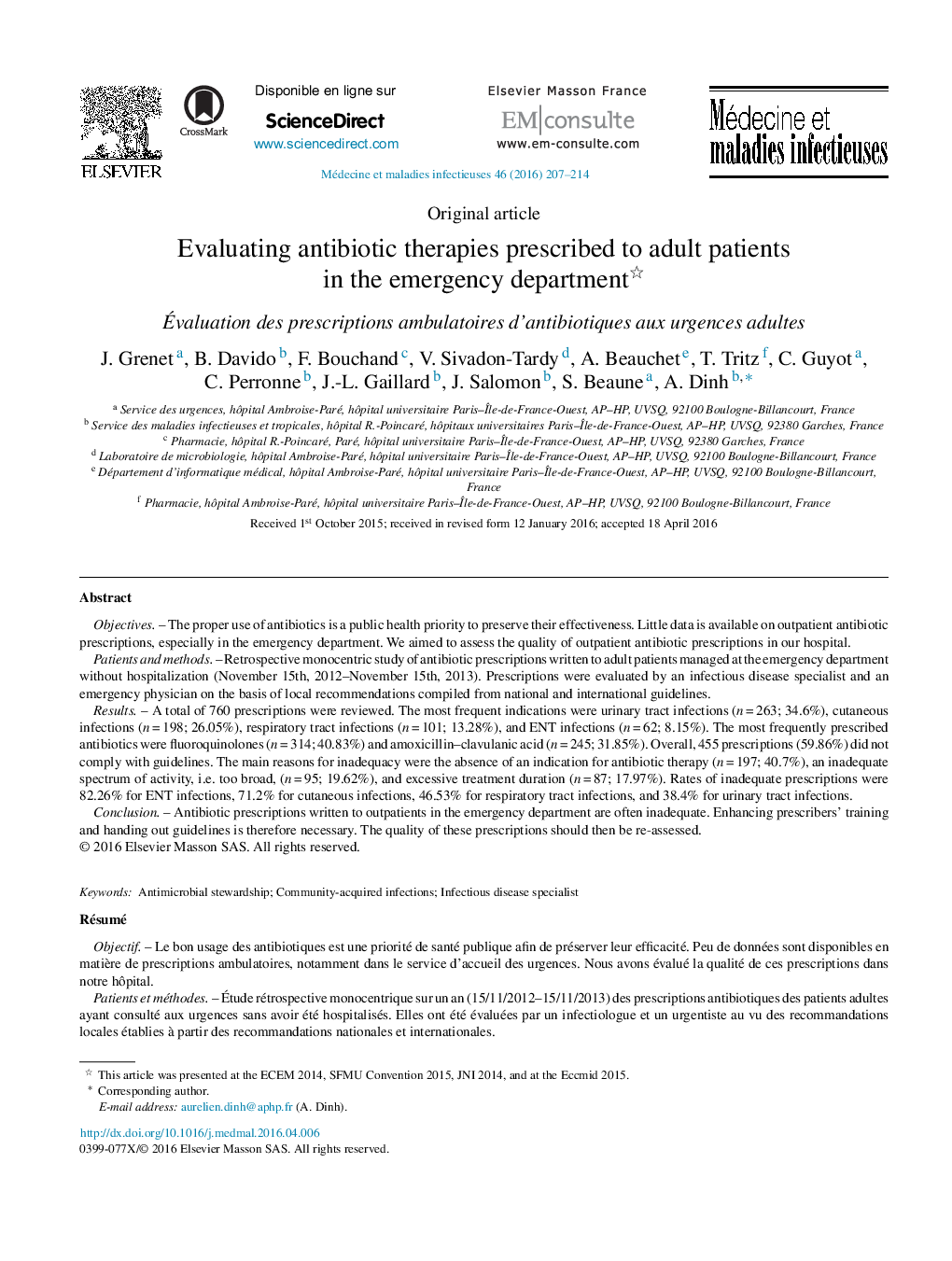| کد مقاله | کد نشریه | سال انتشار | مقاله انگلیسی | نسخه تمام متن |
|---|---|---|---|---|
| 3412280 | 1224220 | 2016 | 8 صفحه PDF | دانلود رایگان |
ObjectivesThe proper use of antibiotics is a public health priority to preserve their effectiveness. Little data is available on outpatient antibiotic prescriptions, especially in the emergency department. We aimed to assess the quality of outpatient antibiotic prescriptions in our hospital.Patients and methodsRetrospective monocentric study of antibiotic prescriptions written to adult patients managed at the emergency department without hospitalization (November 15th, 2012–November 15th, 2013). Prescriptions were evaluated by an infectious disease specialist and an emergency physician on the basis of local recommendations compiled from national and international guidelines.ResultsA total of 760 prescriptions were reviewed. The most frequent indications were urinary tract infections (n = 263; 34.6%), cutaneous infections (n = 198; 26.05%), respiratory tract infections (n = 101; 13.28%), and ENT infections (n = 62; 8.15%). The most frequently prescribed antibiotics were fluoroquinolones (n = 314; 40.83%) and amoxicillin–clavulanic acid (n = 245; 31.85%). Overall, 455 prescriptions (59.86%) did not comply with guidelines. The main reasons for inadequacy were the absence of an indication for antibiotic therapy (n = 197; 40.7%), an inadequate spectrum of activity, i.e. too broad, (n = 95; 19.62%), and excessive treatment duration (n = 87; 17.97%). Rates of inadequate prescriptions were 82.26% for ENT infections, 71.2% for cutaneous infections, 46.53% for respiratory tract infections, and 38.4% for urinary tract infections.ConclusionAntibiotic prescriptions written to outpatients in the emergency department are often inadequate. Enhancing prescribers’ training and handing out guidelines is therefore necessary. The quality of these prescriptions should then be re-assessed.
RésuméObjectifLe bon usage des antibiotiques est une priorité de santé publique afin de préserver leur efficacité. Peu de données sont disponibles en matière de prescriptions ambulatoires, notamment dans le service d’accueil des urgences. Nous avons évalué la qualité de ces prescriptions dans notre hôpital.Patients et méthodesÉtude rétrospective monocentrique sur un an (15/11/2012–15/11/2013) des prescriptions antibiotiques des patients adultes ayant consulté aux urgences sans avoir été hospitalisés. Elles ont été évaluées par un infectiologue et un urgentiste au vu des recommandations locales établies à partir des recommandations nationales et internationales.RésultatsSept cent soixante prescriptions ont été revues. Principales pathologies traitées : infections urinaires (n = 263 ; 34,6 %), cutanées (n = 198 ; 26,05 %), respiratoires (n = 101 ; 13,28 %) et ORL (n = 62 ; 8,15 %). Principaux antibiotiques prescrits : fluoroquinolones (n = 314 ; 40,83 %) et amoxicilline–acide clavulanique (n = 245 ; 31,85 %). Quatre cent cinquante-cinq prescriptions (59,86 %) étaient non conformes aux recommandations. Principales causes de non-conformité : absence d’indication à une antibiothérapie (n = 197 ; 40,7 %), spectre d’activité antimicrobienne trop large (n = 95 ; 19,62 %) et durée de traitement trop longue (n = 87 ; 17,97 %). Taux de prescriptions non conformes des principales indications traitées : infections ORL (82,26 %), cutanées (71,2 %), respiratoires (46,53 %) et urinaires (38,4 %).ConclusionLes prescriptions antibiotiques chez les patients ambulatoires aux urgences sont souvent non conformes. Il est nécessaire de renforcer la formation des prescripteurs, diffuser les recommandations et réévaluer la qualité de ces prescriptions.
Journal: Médecine et Maladies Infectieuses - Volume 46, Issue 4, June 2016, Pages 207–214
